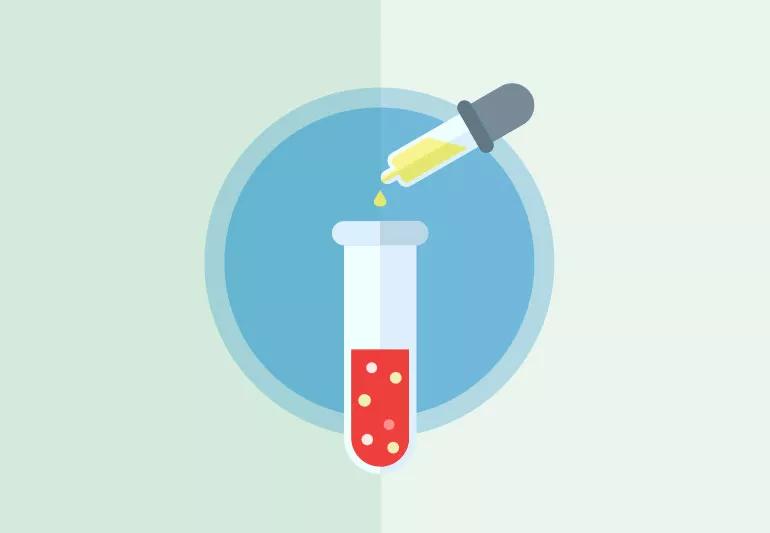Nontraditional markers help doctors pinpoint who needs aggressive treatment

Image content: This image is available to view online.
View image online (https://assets.clevelandclinic.org/transform/19eb06d2-1fc2-4b83-9734-028b5e7270dc/newHeartAttackTests-510167346-770x553_jpg)
Blood sample testing for heart health
Many of us know that cholesterol, blood sugar, blood pressure, body-mass index and smoking are modifiable risk factors for heart disease. If you smoke or have high levels of the other risk factors, you will need to make lifestyle changes and/or take medications to prevent a heart attack. But these measures don’t always stop a serious cardiac event from occurring.
Advertisement
Cleveland Clinic is a non-profit academic medical center. Advertising on our site helps support our mission. We do not endorse non-Cleveland Clinic products or services. Policy
“Treating these risk factors reduces heart attacks by 50 percent. This means 50 percent still happen,” says Stanley Hazen, MD, PhD, Co-section Head of Preventive Cardiology and Rehabilitation.
Researchers have looked long and hard for additional ways to improve risk prediction. Over the years, many substances in the blood have been identified as possibilities. However, only a small number of these biomarkers have been proven effective enough to be widely adopted.
We want to be able to identify people who remain at risk, so we can treat them more aggressively to attenuate that risk.
At Cleveland Clinic, nontraditional biomarkers in routine use include high-sensitivity C-reactive protein (hsCRP), lipoprotein(a), homocysteine, trimethylamine N-oxide (TMAO), myeloperoxidase and N-terminal pro-brain natriuretic peptide (NT-proBNP).
“All have significant data supporting findings that they provide independent prognostic value beyond traditional risk factors,” says Dr. Hazen.
Here we explain what these biomarkers are, and why your doctor might want to test for one of them:
hsCRP. HsCRP indicates inflammation is present somewhere in the body. High CRP levels are associated with higher risk of coronary artery disease (CAD) and heart attack.
In clinical trials, hsCRP was shown to be a reliable indicator of patients who would substantially benefit from more intensive statin therapy.
Advertisement
“The test is useful for identifying people whose elevated risk was not picked up by tests for traditional risk factors, as well as those who remain at risk, despite being on treatment. I order a CRP test at the first visit to see if a patient’s statin therapy is adequate or needs to be more aggressive,” Dr. Hazen explains.
Myeloperoxidase. Myeloperoxidase is a marker of inflammation in the blood vessels. A high level signifies an increased risk of heart attack.
“We may measure myeloperoxidase at a patient’s initial visit in order to determine our LDL goal. If myeloperoxidase levels are high, we will be more aggressive with antiplatelet and LDL-lowering therapy,” he says.
Lipoprotein(a). Lipoprotein(a) is a genetic marker of increased risk of CAD and heart attack in men under age 55 and all women, especially those over age 55.
In patients with a strong family history of CAD, high lipoprotein(a) levels indicate higher risk. “We recommend all first-degree relatives of these patients be screened,” says Dr. Hazen.
Because lipoprotein(a) is attached to LDL cholesterol, more aggressive lowering of LDL is necessary to lower risk. Aspirin also may be prescribed to decrease an elevated risk of thrombosis (blood clots).
Homocysteine. Every 10 percent rise in homocysteine levels is associated with a 10 percent increased risk of CAD. However, lowering homocysteine does not decrease risk.
Currently, homocysteine is used primarily to identify which patients with chronic kidney disease (CKD) are at increased risk for a cardiac event. “We are more aggressive with blood pressure and cholesterol reduction in these patients,” says
Dr. Hazen.
TMAO. TMAO makes blood platelets prone to clotting. High levels of TMAO have been found to be a strong predictor of increased risk for a heart attack or stroke caused by a blood clot.
Dr. Hazen led Cleveland Clinic’s team that discovered this biomarker. They subsequently, developed a blood test that is now available nationwide to determine TMAO levels. More recently, they developed a new type of drug that
blocks the formation of TMAO in the gut.
NT-proBNP. BNP is a hormone that causes blood pressure to rise and the body to retain sodium and water. High levels of NT-proBNP can alert doctors to worsening left ventricular ejection fraction, making the test valuable for diagnosing heart failure in asymptomatic patients.
“When we see NT-proBNP levels are high, we take extra care to make sure blood pressure is well controlled with standard heart failure medications,” says Dr. Hazen.
Advertisement
This article originally appeared in Cleveland Clinic Heart Advisor.
Advertisement

Sign up for our Health Essentials emails for expert guidance on nutrition, fitness, sleep, skin care and more.
Learn more about our editorial process.
Advertisement
The stress of a high-stakes game can trigger a heart attack in people who are at high risk
Inflammation caused by the influenza virus can lead to deadly heart complications
Dramatic chest pain isn't always one of the clues
The warning signs of trouble and how to prevent it
Knowing the difference may not be as easy as you think
The short answer from an interventional cardiologist
There’s no way to stop it once a heart attack is happening, but the most important thing you can do is to call for help
Your natural estrogen levels support a healthy heart by improving your cholesterol, increasing blood flow and reducing free radicals
Type 2 diabetes isn’t inevitable with these dietary changes
Applying a hot or cold compress can help with pain
Pump up your iron intake with foods like tuna, tofu and turkey